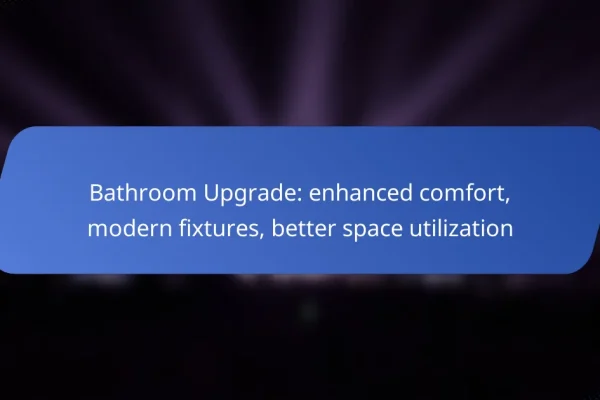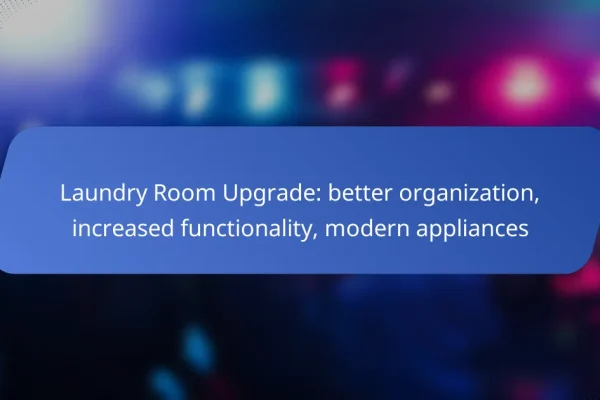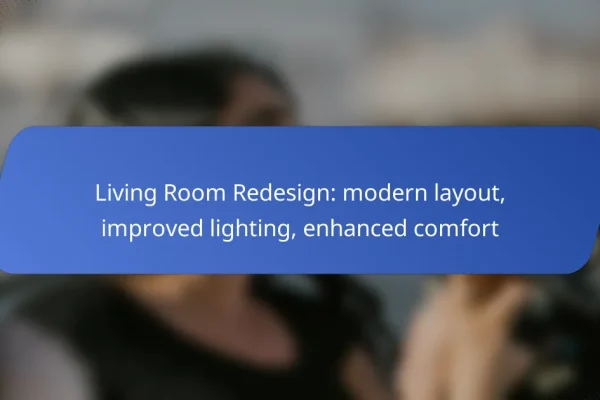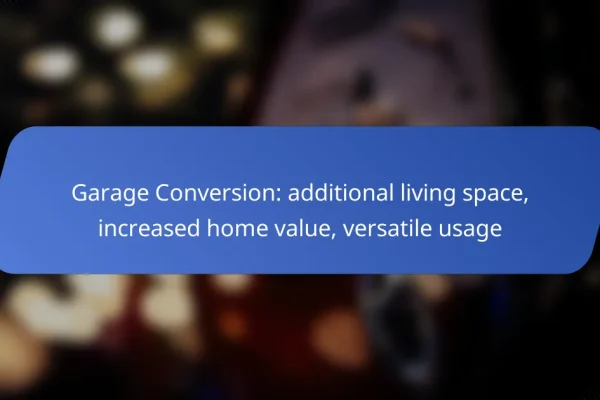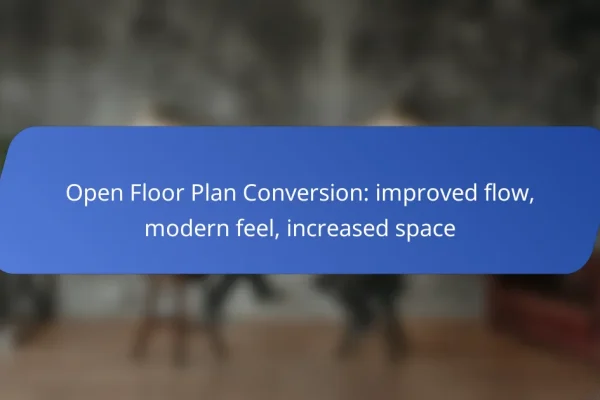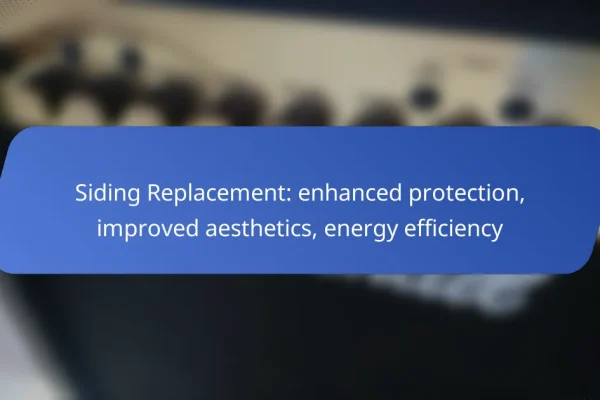What are the common reasons for home renovations in the UK?
Home renovations in the UK often stem from a desire to enhance property value, improve energy efficiency, and adapt to changing lifestyles. These projects can range from minor updates to major overhauls, depending on the homeowner’s goals and budget.
Increasing property value
One of the primary reasons for home renovations is to increase property value. Upgrading kitchens and bathrooms, adding extensions, or enhancing curb appeal can significantly boost a home’s market price. Homeowners should consider focusing on high-return projects, such as modernizing fixtures or improving outdoor spaces.
Research suggests that well-planned renovations can yield returns of 70% to 90% on investment. Prioritizing renovations that align with local market trends can further maximize value.
Improving energy efficiency
Renovating to improve energy efficiency is increasingly popular among UK homeowners. This can involve installing better insulation, upgrading windows, or incorporating renewable energy sources like solar panels. Such improvements not only reduce energy bills but also contribute to environmental sustainability.
Investing in energy-efficient upgrades can lead to savings of 20% to 30% on energy costs. Homeowners may also qualify for government grants or incentives aimed at promoting energy efficiency.
Enhancing aesthetics
Many homeowners choose renovations to enhance the aesthetics of their living spaces. This can include updating paint colors, flooring, or fixtures to create a more modern and appealing environment. Aesthetic improvements can make a home feel more comfortable and inviting.
When planning aesthetic renovations, consider current design trends and personal style preferences. Simple changes, like new lighting or landscaping, can have a significant impact without a large investment.
Adapting to lifestyle changes
As families grow or change, home renovations can help adapt living spaces to new lifestyles. This may involve creating additional bedrooms, converting basements into usable spaces, or designing open-plan areas for better flow. These changes can make a home more functional and comfortable.
Homeowners should assess their current needs and future plans when considering renovations. Flexibility in design can accommodate changing family dynamics over time.
Fixing structural issues
Addressing structural issues is a critical reason for home renovations. Problems such as dampness, foundation cracks, or outdated plumbing can pose serious risks if left unaddressed. Renovating to fix these issues ensures the safety and longevity of the home.
Homeowners should conduct regular inspections to identify potential structural problems early. Prioritizing repairs can prevent more extensive damage and costs down the line.
How do home renovations improve energy efficiency?
Home renovations can significantly enhance energy efficiency by incorporating modern materials and technologies. These upgrades reduce energy consumption, lower utility bills, and create a more comfortable living environment.
Upgrading insulation
Upgrading insulation is one of the most effective ways to improve energy efficiency in a home. Proper insulation minimizes heat loss during winter and keeps interiors cool in summer, leading to reduced heating and cooling costs. Consider using materials like spray foam or fiberglass, which can provide better thermal resistance.
When upgrading insulation, pay attention to areas such as attics, walls, and basements. Ensure that the insulation meets local building codes and energy standards to maximize effectiveness.
Installing energy-efficient windows
Energy-efficient windows are designed to minimize heat transfer, which can lead to significant energy savings. Look for windows with double or triple glazing, low-emissivity (Low-E) coatings, and gas fills that enhance insulation. These features can reduce heating and cooling demands by up to 30%.
When selecting windows, consider the climate in your area. For instance, in colder regions, focus on windows that retain heat, while in warmer areas, prioritize those that reflect sunlight. Proper installation is crucial to ensure there are no air leaks.
Utilizing renewable energy sources
Utilizing renewable energy sources, such as solar panels or wind turbines, can greatly enhance a home’s energy efficiency. These systems can generate clean energy, reducing reliance on fossil fuels and lowering energy bills. Solar panels, for example, can offset a significant portion of electricity costs, especially in sunny regions.
Before installing renewable energy systems, evaluate your home’s energy needs and local regulations. Incentives or rebates may be available to offset installation costs, making it more financially viable. Be sure to consult with professionals to determine the best system for your location and energy goals.
What are the financial benefits of home renovations?
Home renovations can lead to significant financial benefits, including increased property value and lower ongoing costs. By investing in upgrades, homeowners can enhance their living spaces while also improving their financial standing.
Increased resale value
Renovating your home can substantially boost its resale value. Upgrades such as kitchen remodels, bathroom renovations, and adding energy-efficient features often yield a high return on investment, sometimes exceeding 70% of the renovation costs.
When planning renovations, consider the preferences of potential buyers in your area. For example, modernizing outdated fixtures or enhancing curb appeal can make your home more attractive in a competitive market.
Reduced utility bills
Home renovations that focus on energy efficiency can lead to lower utility bills. Upgrading insulation, windows, and HVAC systems can reduce energy consumption, resulting in savings that can amount to hundreds of dollars annually.
Consider investing in Energy Star-rated appliances and smart home technology, which can further optimize energy use. Homeowners should evaluate their current energy costs to identify the most impactful upgrades.
Tax incentives for energy upgrades
Many regions offer tax incentives for homeowners who make energy-efficient upgrades. These incentives can include tax credits or rebates for installing solar panels, energy-efficient windows, or high-efficiency heating and cooling systems.
Before starting renovations, research local regulations and available incentives. Programs can vary widely by state or country, so understanding the specifics can help maximize your financial benefits. For instance, in the U.S., the federal government offers various tax credits for energy-efficient home improvements, which can significantly offset renovation costs.
What are the popular renovation trends in the UK?
In the UK, popular renovation trends focus on creating functional and modern living spaces. Homeowners are increasingly prioritizing open-plan designs, integrating smart technology, and using eco-friendly materials to enhance both comfort and sustainability.
Open-plan living spaces
Open-plan living spaces have gained significant popularity as they promote a sense of spaciousness and connectivity within the home. By removing walls between the kitchen, dining, and living areas, homeowners can create a more inviting atmosphere that encourages social interaction.
When considering an open-plan layout, think about how to maintain distinct zones using furniture arrangement or area rugs. It’s essential to ensure adequate lighting and ventilation, as these spaces can feel cramped without proper design elements.
Smart home technology
Smart home technology is transforming how homeowners interact with their living spaces. Features like smart thermostats, lighting systems, and security cameras offer convenience and energy efficiency, allowing users to control their homes remotely.
To integrate smart technology effectively, start with devices that enhance your daily routines, such as smart speakers or automated lighting. Be mindful of compatibility between devices and consider investing in a central hub to streamline control.
Eco-friendly materials
Eco-friendly materials are becoming a staple in home renovations as more homeowners seek sustainable options. Materials such as reclaimed wood, bamboo, and recycled metal not only reduce environmental impact but also add unique character to spaces.
When selecting eco-friendly materials, look for certifications like FSC (Forest Stewardship Council) for wood products or ENERGY STAR ratings for appliances. This ensures that your choices contribute to sustainability while maintaining quality and durability.
What factors should be considered before starting a renovation?
Before starting a renovation, it’s essential to evaluate several key factors that can significantly impact the project’s success. These include budget, timeline, design goals, and potential disruptions to daily life.
Budget planning
Effective budget planning is crucial for any renovation project. Start by determining how much you can realistically spend, factoring in costs for materials, labor, permits, and unexpected expenses, which can often add 10-20% to the initial estimate.
Create a detailed budget breakdown that includes all aspects of the renovation. This should cover major expenses like structural changes and minor costs such as paint and fixtures. Consider using a spreadsheet to track these expenses and adjust as needed.
Be mindful of common pitfalls, such as underestimating costs or failing to account for delays. It’s wise to set aside a contingency fund to manage any surprises that may arise during the renovation process.
